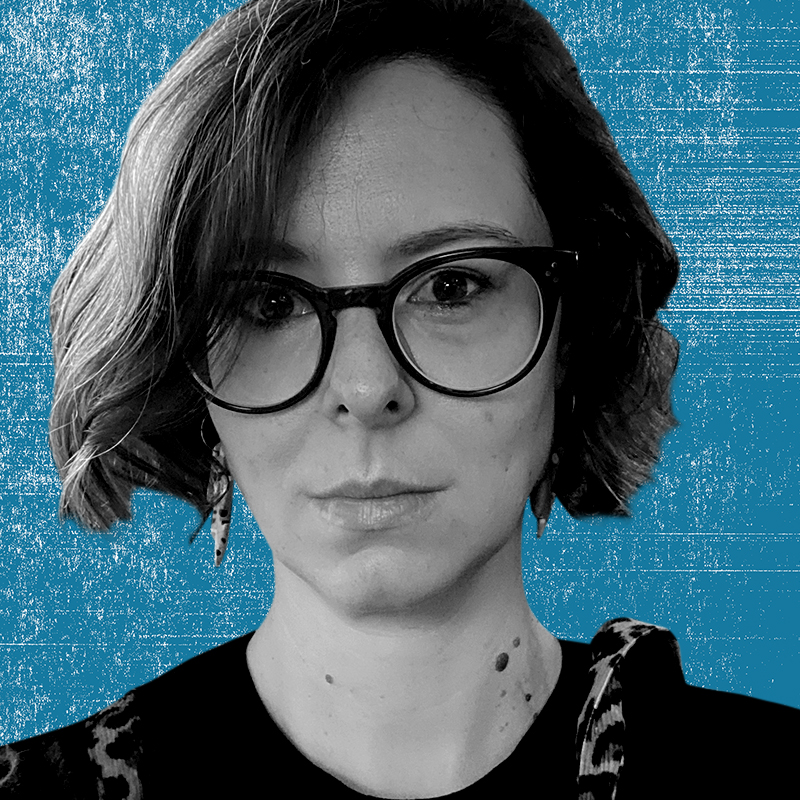Dr Caroline Edwards




Caroline holds a PhD in Critical Theory from the University of Nottingham and has over a decade of experience in academia, having joined Birkbeck, University of London in 2013. Her academic research underpins her commitment to activism, focusing on utopian possibility as it intersects with questions of aesthetics, politics and agency on the page and in the world.
Caroline co-founded the OLH in 2015 in response to the deep-seated legacies of inequality in traditional commercial academic publishing, and envisages the organisation as the trojan horse that disrupts and challenges the academic publishing sector from within.
Caroline left London for Brighton’s great outdoors in 2019 and has never looked back. When she isn’t writing about mushrooms, Caroline enjoys going on road trips in her electric VW – affectionately named Danaerys Cargeryan – watching old sci-fi and silent films, and going to gigs by experimental folk collective Heilung. Caroline has taken part in BBC Radio 4’s Women’s Hour, has interviewed Margaret Atwood, and once worked in a teapot factory.
Selected publications.
Books.
Caroline has published 1 monograph, 2 edited collections, and 23 journal articles and book chapters. She is completing a 2nd monograph and a 3rd edited collection.
Utopia and the Contemporary British Novel (Cambridge University Press, 2019)
China Miéville: Critical Essays (co-editor; Gylphi, 2015)
Maggie Gee: Critical Essays (co-editor; Gylphi, 2015)
The Cambridge Companion to British Utopian Literature and Culture, 1945-2020 (forthcoming)
Hopeful Inhumanism: The Elemental Aesthetics of Ecocatastrophe (forthcoming)
Journal articles.
“Xyloid Sexuality: Dismantling the Human in Wangechi Mutu’s Arboreal Collages,” Cultural Politics (accepted for publication, forthcoming 2024) (green OA copy available at BIROn)
“Hope Draped in Black: Decolonizing Utopian Studies,” Utopian Studies, Vol. 34, No. 3 (2023), pp. 498-509 (available via Project Muse)
“Reflecting on the Black Fantastic: An Interview with Ekow Eshun,” Foundation, Vol. 52, No. 2 (2023), pp. 64-79
“Becoming-lithic: elemental utopian possibility in the contemporary ecocatastrophe,” Textual Practice, Vol. 37, No. 9 (2023), pp. 1364-1387 (available open access)
“All Aboard for Ararat!: Islands in Contemporary Flood Fiction,” ASAP/Journal, Vol. 4, No. 1 (2019), pp. 217-243 (available via Project Muse, green OA copy available at BIROn)
“From Eros to Eschaton: Herbert Marcuse’s Liberation of Time,” Telos, Issue 165 (“Marcuse After Secularism” special issue) (2013), pp. 91-114 (green OA copy available at BIROn)
“Rethinking the Arcadian Revenge: Metachronous Times in the Fiction of Sam Taylor,” Modern Fiction Studies, Vol. 58, No. 3 (Special Issue on “New British Fiction”) (2012), pp. 477-502 (green OA copy available on BIROn)
“Collective Subjects and Political Transformation,” Subjectivity, Vol. 4, No. 1 (2011), pp. 1-8
“Interview with Jon McGregor,” Contemporary Literature, Vol. 51, No. 2 (2010), pp. 217-245
“Microtopias: The Post-apocalyptic Communities of Jim Crace’s The Pesthouse,” Textual Practice, Vol. 23, No. 5 (2009), pp. 763-786 (green OA copy available on BIROn)
Book chapters.
“Editor’s Introduction,” The Cambridge Companion to British Utopian Literature and Culture, 1945-2020, ed. Caroline Edwards (Cambridge University Press, forthcoming 2024)
“The Future City,” The Idea of the City in British Literature, ed. Matthew Beaumont and Gregory Dart (Cambridge University Press, forthcoming 2024)
“Utopianism,” The Oxford Handbook of New Science Fiction Cinemas, ed. J. P. Telotte (Oxford University Press, 2023), pp. 295-315
“Climate in Science Fiction” in Science Fiction: Exhibition Companion, ed. Glyn Morgan (Thames and Hudson, 2022), pp. 244-265
“A Housewife’s Dream? Automation and the Problem of Women’s Free Time,” Technologies of Feminist Speculative Fiction, ed. Sherryl Vint and Sumeyra Buran (Palgrave, 2022), pp. 111-138
“Utopia and Science Fiction,” Palgrave Handbook of Utopian and Dystopian Literature, ed. Jennifer Wagner-Lawlor, Fátima Vieira and Peter Marks (Palgrave, 2022), pp. 177-190
“Hope,” Future Theory: A Handbook of Critical Concepts, ed. Patricia Waugh and Marc Botha (Bloomsbury, 2021), pp. 433-448
“Experiment and the Genre Novel: British Fiction, 1980-2018,” The Cambridge Companion to British Fiction, 1980-2018, ed. Peter Boxall (Cambridge University Press, 2019), pp. 150-168
“Like Any Other Commodity? Literary Prize Culture, Commercialisation and the Rise of a New Reading Public,” British Literature in Transition, 1980–2000: Accelerated Times, ed. Eileen Pollard and Berthold Schoene (Cambridge University Press, 2019), pp. 325-340
“The Networked Novel,” The Routledge Companion to Twenty-First Century Literary Fiction, ed. Daniel O’Gorman and Robert Eaglestone (Routledge, 2018), pp. 13-24
“Utopian Prospects,” Science Fiction: A Literary History, ed. Roger Luckhurst (British Library Press, 2017), pp. 72-101
“UnIntroduction: China Miéville’s Weird Universe” (co-written with Antonio Venezia), China Miéville: Critical Essays, ed. Caroline Edwards and Antonio Venezia (Canterbury: Gylphi, 2015), pp. 1-38
“Beyond the Blue: The Sorrowful Joy of Gee” (co-written with Sarah Dillon), Maggie Gee: Critical Essays, ed. Sarah Dillon and Caroline Edwards (Canterbury: Gylphi, 2015), pp. 1-29
“Unearthing the ‘gold-bearing rubble’: Ernst Bloch’s Literary Criticism,” Utopianism, Modernism and Literature in the Twentieth Century, ed. Alice Reeve-Tucker and Nathan Waddell (Palgrave, 2013), pp. 182-203 (green OA copy available at BIROn)
“Strange Transactions: Utopia, Transmigration and Time in Ghostwritten and Cloud Atlas,” David Mitchell: Critical Essays, ed. Sarah Dillon (Canterbury: Gylphi, 2010), pp. 179-203
Caroline has given more than 60 keynote talks and guest lectures since 2013. Highlights include the Distinguished Faber Lecture at Princeton University in 2021 and interviewing Margaret Atwood for New Scientist Live in 2017. She has also secured £709,985 in funding for research activities since 2006.
